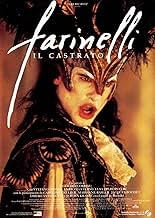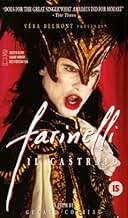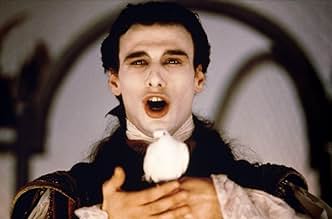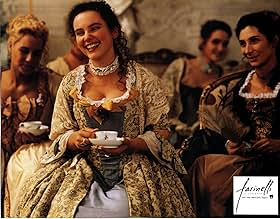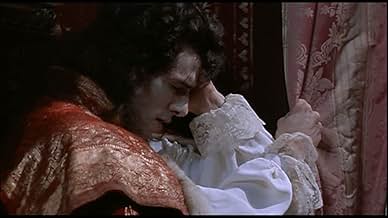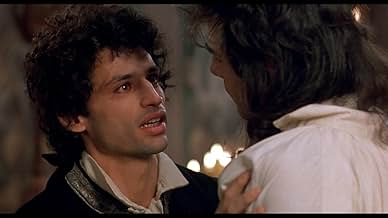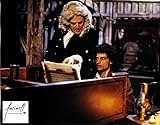Farinelli
NOTE IMDb
6,8/10
7,7 k
MA NOTE
Ajouter une intrigue dans votre langueThe story of castrato opera singer Carlo Broschi, who enthralled 18th-century European audiences under his stage name Farinelli.The story of castrato opera singer Carlo Broschi, who enthralled 18th-century European audiences under his stage name Farinelli.The story of castrato opera singer Carlo Broschi, who enthralled 18th-century European audiences under his stage name Farinelli.
- Réalisation
- Scénario
- Casting principal
- Nommé pour 1 Oscar
- 6 victoires et 4 nominations au total
Avis à la une
Visually and sound-wise this is a beautiful film that can be recommended. The flash-backs when Ricardo looks back on childhood are good, showing the tight links between the two brothers. But, one is waiting through the whole film for the continuation of the early scene where Carlo (Farinelli) does not try to prevent the soldiers from taking Ricardo away by force. There is too much focus on the brothers' conquests and maybe too little on the singing. But the songs that we hear are beautiful and when one knows the amount of work that has been put into the reconstruction of Farinelli's unique voice (covering one octave more than any singer alive today) one should probably not complain.
'Farinelli' is a film well worth seeing for its memorable visual imagery and its unique soundtrack. Mid-film scenes set against the decadence of 17th-century European court life make for charming costumes and sets. Contrasting visuals of rural Italy provide their own pastoral allure that is no less charming. Moreover, the film rises admirably to the daunting technical and artistic task of reproducing the tone of a castrato voice, considering that the musical world has not seen or heard a castrato singer for more than a century.
'Ah,' you say, 'sounds gorgeous...but what's it about?' Enter Carlo and Riccardo Broschi, Italian brothers who share musical aspirations: Riccardo composes, and Carlo sings what he writes. Carlo is a gifted castrato, but Riccardo is a mediocre composer at best. In time, Carlo becomes the renowned Farinelli while Riccardo struggles with his lack of talent/recognition as well as the troublesome fact that Carlo is his meal ticket.
The simple story line masks rich potential (think 'Amadeus'), but 'Farinelli' is hampered by shallow character development and its inexplicable tendency to substitute all-too-frequent sex scenes for emotional power. Without the full realization of the characters or the ramifications of the plot, the film struggles to keep a viewer engaged, at least in my own case. The beautiful pageantry of 'Farinelli' fails to compensate for its hollow dramatic core.
In short? Not bad, but a better music movie is 'Amadeus'(among others), and a better movie with beautiful Italian visuals is 'A Room With A View' (among others).
'Ah,' you say, 'sounds gorgeous...but what's it about?' Enter Carlo and Riccardo Broschi, Italian brothers who share musical aspirations: Riccardo composes, and Carlo sings what he writes. Carlo is a gifted castrato, but Riccardo is a mediocre composer at best. In time, Carlo becomes the renowned Farinelli while Riccardo struggles with his lack of talent/recognition as well as the troublesome fact that Carlo is his meal ticket.
The simple story line masks rich potential (think 'Amadeus'), but 'Farinelli' is hampered by shallow character development and its inexplicable tendency to substitute all-too-frequent sex scenes for emotional power. Without the full realization of the characters or the ramifications of the plot, the film struggles to keep a viewer engaged, at least in my own case. The beautiful pageantry of 'Farinelli' fails to compensate for its hollow dramatic core.
In short? Not bad, but a better music movie is 'Amadeus'(among others), and a better movie with beautiful Italian visuals is 'A Room With A View' (among others).
Something seems strangely amiss with what could have been a fascinating historical glimpse into the world of the castrati (castrated male opera singers) in 18th-century Europe. This 1994 Belgian film is an opulent production full of stunning costumes and set decorations, but director Gerard Corbiau is far more focused on the co-dependency between two real-life brothers, Carlo Broschi, the swoon-worthy castrato known to the world as Farinelli, and his marginally talented composer brother Riccardo. Although there are glimpses of the castration that occurred when Carlo was ten, the narrative deals very little with the psychological anguish of this act, instead showing extravagantly vainglorious scenes of Farinelli's impact on audiences at the time. It's as if the story structure of the Baroque operas written at that time took over the sensibility of the screenplay and trivialized the human complexities into exaggerated melodrama.
Despite a valiant effort by Stefano Dionisi in the title role, Farinelli is portrayed as a moody, self-centered egotist rather than a misunderstood artist. Compounding the problem is the fact that his masculine speaking voice is at odds with his ethereal singing voice (obviously a creative decision so as not to alienate the general audience from the character's plight). Moreover, the computerized melding of countertenor Derek Lee Ragin and soprano Ewa Mallas Godlewska into Farinelli's voice simply does not sync up well with Dionisi's lip and throat movements. In other words, you simply don't believe it's Dionisi's voice coming out of him. When the film finally takes flight in the last third of the film, it's because the focus has shifted to the competitive, intense relationship between Farinelli and the great composer of the age, Handel. Jeroen Krabbe - familiar to American audiences for his nasty turn as Barbra Streisand's condescending husband in "The Prince of Tides" - plays Handel with such passionate fury that I wish the film was more about his character. This sequence climaxes with the film's musical highlight, a trio of wonderful, truly classic arias from Handel's "Rinaldo".
Unfortunately, the remaining musical performances are not nearly as absorbing and rather repetitive. The film again flails toward the end when we are given a rather silly scene involving a solar eclipse and gratuitous nudity with a ménage a trois among Farinelli, Riccardo and Alexandra, the woman who is - quite literally - between them. The remaining performances are fine with Enrico LoVerso conveying his Salieri-like inferiority with appropriate fervor, Elsa Zylberstein beguiling as Alexandra and Caroline Cellier doing a fine Jeanne Moreau impersonation as the jaded Margareth Hunter. Overall it's still a relatively disappointing movie saved by Handel's musical genius. Except for a few trailers, there are no extras with the DVD. For those interested in the world of the castrati in more penetrating detail, I suggest reading Anne Rice's 1982 novel, "Cry to Heaven", and the "Rinaldo" arias are better served by countertenor David Daniels and mezzo-soprano Cecilia Bartoli on their 2002 cast recording conducted by Christopher Hogwood.
Despite a valiant effort by Stefano Dionisi in the title role, Farinelli is portrayed as a moody, self-centered egotist rather than a misunderstood artist. Compounding the problem is the fact that his masculine speaking voice is at odds with his ethereal singing voice (obviously a creative decision so as not to alienate the general audience from the character's plight). Moreover, the computerized melding of countertenor Derek Lee Ragin and soprano Ewa Mallas Godlewska into Farinelli's voice simply does not sync up well with Dionisi's lip and throat movements. In other words, you simply don't believe it's Dionisi's voice coming out of him. When the film finally takes flight in the last third of the film, it's because the focus has shifted to the competitive, intense relationship between Farinelli and the great composer of the age, Handel. Jeroen Krabbe - familiar to American audiences for his nasty turn as Barbra Streisand's condescending husband in "The Prince of Tides" - plays Handel with such passionate fury that I wish the film was more about his character. This sequence climaxes with the film's musical highlight, a trio of wonderful, truly classic arias from Handel's "Rinaldo".
Unfortunately, the remaining musical performances are not nearly as absorbing and rather repetitive. The film again flails toward the end when we are given a rather silly scene involving a solar eclipse and gratuitous nudity with a ménage a trois among Farinelli, Riccardo and Alexandra, the woman who is - quite literally - between them. The remaining performances are fine with Enrico LoVerso conveying his Salieri-like inferiority with appropriate fervor, Elsa Zylberstein beguiling as Alexandra and Caroline Cellier doing a fine Jeanne Moreau impersonation as the jaded Margareth Hunter. Overall it's still a relatively disappointing movie saved by Handel's musical genius. Except for a few trailers, there are no extras with the DVD. For those interested in the world of the castrati in more penetrating detail, I suggest reading Anne Rice's 1982 novel, "Cry to Heaven", and the "Rinaldo" arias are better served by countertenor David Daniels and mezzo-soprano Cecilia Bartoli on their 2002 cast recording conducted by Christopher Hogwood.
Famed 18th century (castrato) soprano Ferinelli invites a serious biographical study. This 17-18th c. period was, until recent times, skirted over by musicologists and music history teachers.
The result of this omission has been an unsuspecting awareness of the extent to which male performers dominated all forms of period theater, including opera, oratorio, cantata, ballet, and stage plays. "Ferinneli" had an opportunity to provide substantive information in filling this void.
Unfortunately, what resulted is just another Ken Russell-type production (a la "The Music Lovers," "Lisztomania," "Mahler," etc.). In fact, were Andre Corbiau's name not credited as director of "Ferinelli," one would swear this was a Russell composer biopic.
All Russell trademarks are there: excessive closeups of actors in dramatic distress, swirling activity to cover up script weaknesses, and disjointed highlights instead of sequence continuity.
Director-coscriptor Corbiau has Stefano Dionisi as Ferinneli forever falling down and collapsing both on and offstage for no apparent reason, and using the old device of having him hesitate to sing on cue before a full house to superficially create suspense and anxiety.
In fact, Corbiau, like Russell, is more intent on affecting than expressing: manipulating the viewer than sincerely sharing. As a result, one is held a arm's length of emotional participation throughout.
While no contemporary production can create a truly authentic period setting, there are questions which arise here: George Frederick Handel, one of the world's most prolific and fine composers, is reduced to that of a mere rival theatrical impressario; and Farinelli is forever acting oddly--claiming vocal loss, serious indisposition, and tripping out on opium. Indeed, at times this seems more like a baroque version of sex-drugs-and-rock-'n'roll.
On the brighter side, the staging of the operatic scenes are wonderfully on-target, having been obviously well-researched and meticulously designed. The combination real-and-computer-created vocal work is fascinating in its etherial timbre and in its negotiation of Handelean melismas, embellishments and assorted ornamentation. Likewise, the baroque pit orchestra and period opera house decor is strikingly detailed.
What a pity "Farinelli" fails in its main opportunity: to convey a simple, heart-felt story of one of history's most celebrated singers.
The result of this omission has been an unsuspecting awareness of the extent to which male performers dominated all forms of period theater, including opera, oratorio, cantata, ballet, and stage plays. "Ferinneli" had an opportunity to provide substantive information in filling this void.
Unfortunately, what resulted is just another Ken Russell-type production (a la "The Music Lovers," "Lisztomania," "Mahler," etc.). In fact, were Andre Corbiau's name not credited as director of "Ferinelli," one would swear this was a Russell composer biopic.
All Russell trademarks are there: excessive closeups of actors in dramatic distress, swirling activity to cover up script weaknesses, and disjointed highlights instead of sequence continuity.
Director-coscriptor Corbiau has Stefano Dionisi as Ferinneli forever falling down and collapsing both on and offstage for no apparent reason, and using the old device of having him hesitate to sing on cue before a full house to superficially create suspense and anxiety.
In fact, Corbiau, like Russell, is more intent on affecting than expressing: manipulating the viewer than sincerely sharing. As a result, one is held a arm's length of emotional participation throughout.
While no contemporary production can create a truly authentic period setting, there are questions which arise here: George Frederick Handel, one of the world's most prolific and fine composers, is reduced to that of a mere rival theatrical impressario; and Farinelli is forever acting oddly--claiming vocal loss, serious indisposition, and tripping out on opium. Indeed, at times this seems more like a baroque version of sex-drugs-and-rock-'n'roll.
On the brighter side, the staging of the operatic scenes are wonderfully on-target, having been obviously well-researched and meticulously designed. The combination real-and-computer-created vocal work is fascinating in its etherial timbre and in its negotiation of Handelean melismas, embellishments and assorted ornamentation. Likewise, the baroque pit orchestra and period opera house decor is strikingly detailed.
What a pity "Farinelli" fails in its main opportunity: to convey a simple, heart-felt story of one of history's most celebrated singers.
This movie is about Farinelli, one of the famous Castro Singers during the 18th century. He had the voice of an angel when he was a boy and since his family was very poor, an operation of castration was done to him in order to preserve his voice and help his family out in poverty. There were some strange parts during this film such as when he got older he and his brother Riccardo traveled together and never left each other. His brother was there during Farinelli's lovemaking in order to complete and finish the task that his brother could not do since he had been castrated. And then there was the white horses that Farinelli saw every time danger was present or near. This warning was not clearly explained in the film. The acting was very good. I enjoyed the variation of languages of French and Italian with a little bit of English thrown in. The costumes were excilent and the way the actors portrayed the characters during that past time period were done good. One makes you feel sorry for Farinelli because of what he did lack and also makes you feel for him because everybody would make a specticle of him because of his castration and the fact that he could not complete the task of lovemaking (personally..... I do not think that he really needed that, he was good being his own person anyway). Farinelli's popularity had worn down during the middle of his career due to his excessive use of opium in which his brother provided for him in order for him to sleep and get rid of any pain or stress. During the end of the movie we find that it is Riccardo that turned his little brother in because of his ability to sing and thus help his poor familiy. Not much is mentioned of his familiy but in the beginnig of the movie we do know that his family was poor and Farinelli offered himself as well as his voice because his voice was all that he did have in order to stay alive. This movie was a good film and I give it about a 7. There were several parts in the film that were not clearly explained and that was the only flaw.
Le saviez-vous
- AnecdotesBoth male and female voices were combined to create the sound of Farinelli's singing voice. The male voice was Derek Lee Ragin, a British countertenor and the female Ewa Malas-Godlewska, a Polish mezzo-soprano.
- GaffesLIGHTING. In scenes that show stage lights and chandeliers, the focus on them is softened, but it can still be seen that the "lamps" and "candles" are in fact far too steady, and too smokeless, to be or to contain live flame. Gaslight was not brought into theatres until just after 1800 (in England), and limelight -- with real quicklime -- around 1820. Also, some outdoor lighting -- outside palaces, etc. -- is obviously too bright, blue- or green-shaded, smokeless, and sharp-edged to come from a bonfire.
- Citations
Carlo Broschi: I admire your nerve, madame, in daring to defy Handel.
Countess Mauer: Women are very strong, signor Farinelli. Men's weaknesses make it necessary.
- ConnexionsFeatured in The 52nd Annual Golden Globe Awards (1995)
- Bandes originalesOmbra fedele anch'io
[Dario's Solo: Act II, Scene XI, from Opera "Idaspe"]
Composed by Riccardo Broschi, Libretto by G.P. Candi and Domenico Lalli (1730, Venice)
Vocals performed by Ewa Malas-Godlewska (Soprano) and Derek Lee Ragin (Countertenor)
Meilleurs choix
Connectez-vous pour évaluer et suivre la liste de favoris afin de recevoir des recommandations personnalisées
- How long is Farinelli?Alimenté par Alexa
Détails
- Date de sortie
- Pays d’origine
- Site officiel
- Langues
- Aussi connu sous le nom de
- 絕代艷姬
- Lieux de tournage
- Sociétés de production
- Voir plus de crédits d'entreprise sur IMDbPro
Box-office
- Montant brut aux États-Unis et au Canada
- 1 573 411 $US
- Montant brut mondial
- 1 600 226 $US
Contribuer à cette page
Suggérer une modification ou ajouter du contenu manquant


